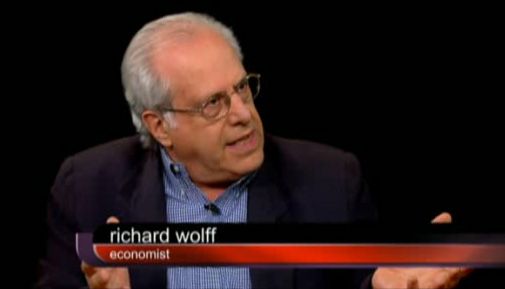
LOS ANGELES — “I’ve got to pinch myself; I’m having the time of my life,” proclaimed Prof. Richard Wolff, as a standing-room-only throng of 550 mobbed the musicians union hall in Hollywood. The Jan. 18 appearance was co-presented by Pacifica Radio’s KPFK and LAProgressive.com. Like the estimated 650 listeners at a church in Berkeley on Jan. 15, they flocked to hear the unapologetically self-avowed “Marxian economist” who has long toiled in the obscurity of academia and left circles. Born in Youngstown, Ohio, in 1942, Wolff holds a B.A. from Harvard, a Master’s from Stanford, and a Ph.D. in economics from Yale. He’s a UMass Amherst professor emeritus and visiting professor in international affairs at the New School University.
“It’s not me; it’s the message, which has remained the same,” Wolff said modestly, as his critique of capitalism has propelled him into the limelight with repeat TV appearances with Bill Moyers and Charlie Rose, plus much other media coverage. Since the 2008 financial meltdown, as the contradictions and collapse of a capitalist system no longer able to deliver the goods become blatantly obvious, Wolff is finding increasingly receptive audiences. Wolff stresses not the “dictatorship of the proletariat,” but “democratization of the workplace” as an alternative to capitalism’s failure.
During his Hollywood address, Wolff said: “The capitalist workplace is one of the most profoundly undemocratic institutions on the face of the Earth. Workers have no say over decisions affecting them. If you really gave a damn about democracy the workplace would be the first place to institute it. … But the government goes to war to bring democracy to Iraq.”
Wolff calls workplace democratization the alternative to top-down Stalinist command models, wherein workers may have owned, but did not run, industries. “The main traditions of socialism and communism devoted themselves to changing the ownership of the means of production from private to social or national, and going from markets as a means of distribution to state planning,” he said. “This has little or nothing to say about the organization of the enterprise itself. That was a major mistake and missing element that did a lot to undermine what traditional socialism did achieve.”
Wolff argues that if workers sat on the board of directors of democratically operated self-managed enterprises they wouldn’t vote for the wildly unequal distribution of profits to benefit a few and for cutbacks for the many. The Progressive magazine asked Wolff why business leaders favor austerity. Doesn’t it reduce demand for their products, and thus lower their potential profits? The author of “Capitalism Hits the Fan“ replied:
“The question is good. … The more successful capitalists are in cutting their wage costs, the less money workers will have to buy back what those same capitalists produce. It’s a contradiction in how this system works. Sure, businesses would like lots of purchases. But the only way to deal with a depressed economy that gets it in a position to have more purchases would be to tax the rich who are hoarding their money and not spending it in an economic downturn, and move that money into the hands of the middle and lower classes, because … they’ll spend it as fast as they get it. That would solve the problem of demand, but only at the expense of the rich and corporations.
“Here’s where globalization comes in. U.S. businesses favor austerity here because they want to decrease the power of labor, save on labor costs, not to be taxed, and they see a way to pull that off by shifting the sales of their products from the U.S.’s depressed, austerity-riddled economy to the exploding economies of Brazil, China, India, and so on. … The U.S. is being reconfigured to become more of an export-focused economy; that’s explicit to Obama policy and a way of managing demand when austerity crunches your own working class’s income.”
What is the 21st century relevancy of 19th century economist Karl Marx? Wolff replied:
“If you think capitalism is a system that has major flaws, such as a recurring business cycle like the one we’ve been in since 2007, and that it produces ever widening gaps between rich and poor, then you’ve answered the question about Marxian economics. … You need to study Marxian economics as part of any serious attempt to understand what’s going on. Not to do it is to exclude yourself from the critical tradition.”
For more info: http://rdwolff.com/ and http://www.democracyatwork.info/.

MOST POPULAR TODAY

High Court essentially bans demonstrations, freedom of assembly in Deep South

Zionist organizations leading campaign to stop ceasefire resolutions in D.C. area

U.S. imperialism’s ‘ironclad’ support for Israel increases fascist danger at home


UN warns that Israel is still blocking humanitarian aid to Gaza






Comments